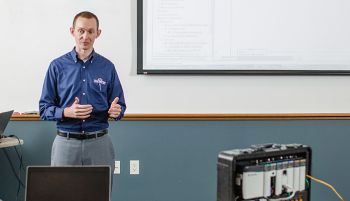What "minor" activities are covered by the Lockout/Tagout standard from OSHA?
- February 23, 2021
- Best Practices
- Automation
Be especially careful with the minor servicing exception in the Lockout/Tagout standard from OSHA. Certain kinds of “minor” activities that occur during normal production operations may not be covered by LOTO (but are covered under other OSHA standard provisions) and other “minor” activities are covered by LOTO; do you know which?

Whenever machinery or equipment is being serviced or maintained, standards under the Occupational Safety and Health Act (known as OSHA) provide a host of potentially applicable health/safety requirements to regulate such work activities. Among those standards is the OSHA standard dealing with the control of hazardous energy (or lockout/tagout-often abbreviated as LOTO). While there are some exempted areas of certain industries, in general, the standard applies to: "...the servicing and maintenance of machines and equipment in which the unexpected energization or start up of the machines or equipment, or release of stored energy, could harm employees."
The standard goes on to state it establishes the minimum performance requirements for the control of such hazardous energy.
Servicing, maintenance defined
The LOTO standard defines the terms "servicing" and "maintenance" which include workplace activities such as constructing, installing, setting up, adjusting, inspecting, modifying, and maintaining and/or servicing machines or equipment. These activities include lubrication, cleaning or unjamming of machines or equipment and making adjustments or tool changes, where the employee may be exposed to the unexpected energization or startup of the equipment or release of hazardous energy. Furthermore, the standard defines "setting up" as any work performed to prepare a machine or equipment to perform its normal production operation.
While LOTO covers many topics, the text here will briefly address the following issues: certain general principles of energy control protection; "normal production operations" (as defined by the standard); and the so-called "minor servicing exception" to the LOTO standard.
As noted above, the LOTO standard is applicable to energy control during "servicing and/or maintenance" of machines and equipment. Accordingly, the LOTO standard provides it does not cover "normal production operations" (as those "normal operations" are covered under other sections of the OSHA standards).
During normal production
However, if servicing and/or maintenance actions take place during "normal production operations," such service and/or maintenance activity is regulated under the LOTO standard if:
- An employee is required to remove or bypass a guard or other safety device; or
- An employee is required to place any part of his or her body into an area on a machine or piece of equipment where work is actually performed upon the material being processed (the point of operation) or where an associated danger zone exists during a machine operating cycle.
OSHA defines the term "normal production operations" as: "The utilization of a machine or equipment to perform its intended production function." Accordingly, running a press to produce stamped parts or using a powered drill to bore holes in material are the kinds of activities likely to be considered "normal production operations." Running those machines to perform the stamping or drilling functions does not, by itself, normally implicate the LOTO standard.
It is when servicing and/or maintenance activities take place on the example press or powered drill that the LOTO standard may provide compliance obligations. For example, if the normal production operations cause a breakdown of the machinery/equipment such that guards must be removed to provide access to motors, circuits, piping/pressurized assemblies, etc., in order to work on the cause of the breakdown, the LOTO standard very likely will apply to regulate such work.
However, the LOTO standard provides that certain kinds of "minor" activities that occur during normal production operations are not covered by the standard, but only as follows:
Minor tool changes and adjustments, and other minor servicing activities, which take place during normal production operations, are not covered by this standard if they are routine, repetitive, and integral to the use of the equipment for production, provided that the work is performed using alternative measures which provide effective protection (such as the machine guarding provisions of the OSHA standards).
Established exceptions
Each and every element of this "minor servicing exception" must be firmly established. If any element is not met or is inapplicable, the exception will not apply. If an employer claims the minor servicing exception applies to the activity at issue, the employer bears the burden of proving each and every element of the minor servicing exception.
Some employers have found that burden difficult to meet. Indeed, OSHA may challenge an employer's claim that the minor servicing exception applies to an activity. Lock out is generally favored as providing a higher level of protection to workers engaged in activities in which control of hazardous energy is critical and vital to safety and health.
Reasonably possible risk mitigation
It should be emphasized whenever an employer chooses to depart from the protections accorded to employees under a full energy control/LOTO procedure; there is an element of risk of employee injury and/or an agency's post-incident disagreement with the employer's interpretation of the applicability of any exception to the LOTO standard. That is why some employers default in favor of full energy control/LOTO protection where feasible/reasonably possible; even where there may be an argument(s) for application of the minor servicing exception to specific circumstances.
Author
Greg Dale is a partner in the OSHA/workplace safety practice of Faegre Baker Daniels. Edited by Mark T. Hoske, content manager, Control Engineering, CFE Media, [email protected].
OSHA provides the lockout tagout standard, LOTO.
Know what qualifies as normal operations and as exceptions.
LOTO and risk mitigation.